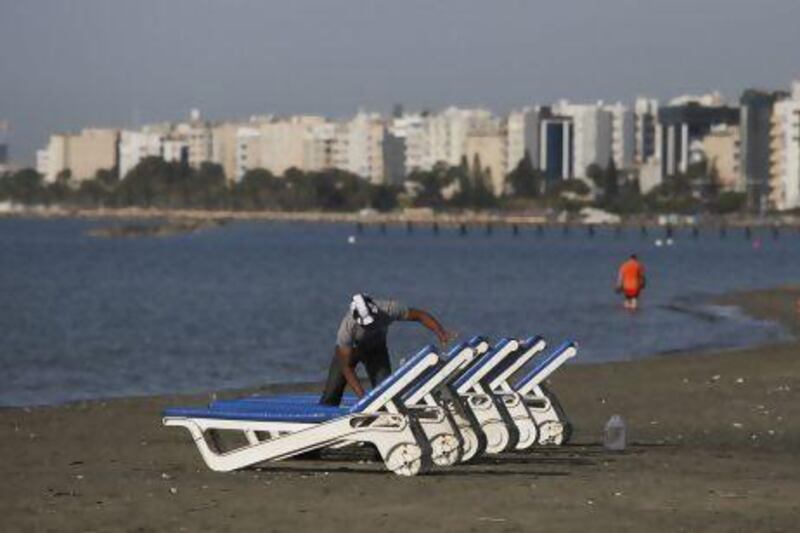NICOSIA // Cyprus is poised to set an unenviable euro zone first in coming weeks by receiving an emergency bailout that could equal its entire annual economic output, worth €17,500 euros (Dh83,000) a person.
President Demetris Christofias, the EU's only communist leader, acknowledged last week he had accepted a preliminary loan deal from the EU and IMF as a bitter last resort, insisting he had no other choice.
The four-year austerity programme will require "painful sacrifices by the workers and our people", he said in a televised speech. "We had to choose between a tough austerity package or the bankruptcy of the banks which would lead to the collapse of the Cyprus economy".
The measures, however, are not as onerous as those imposed on Greece and so are unlikely to ignite the sort of social unrest that periodically has roiled Athens.
Cyprus's international lenders have pencilled in up to €10 billion to recapitalise the Mediterranean island's outsize banking sector which was battered by its exposure to Greece's economic meltdown. The precise figure is due to be revealed this morning following an independent audit of Cyprus's banks by a US investment firm.
Additionally, Cyprus needs an estimated €6bn for debt refinancing and another €1.5bn to cover fiscal deficits. So the total could reach €17.5bn, equivalent to Cyprus's gross domestic product.
That is a steep bill for Cyprus, which has a population of just under a million.
But it is relatively small change for the EU, which has already bailed out Greece, Ireland and Portugal for far larger amounts. Cyprus, the euro zone's second smallest economy after Malta, accounts for just 0.2 per cent of the EU's GDP.
"Cyprus is pretty small in the scheme of things but the EU is determined not to let any of its members go under because of the effect that would have on markets, morale and fears of contagion," a European diplomat in Nicosia said.
In a move intended to reassure Brussels, Cyprus's often fractious parliament voted unanimously last week to pass a first raft of salary cuts and tax increases in accordance with the provisional bailout memorandum. Wages in the bloated and well-paid public sector will be cut by between 6.5 and 12.5 per cent with immediate effect.
The government has also pledged to suspend inflation-indexed pay rises for civil servants, introduce pension reforms and increase the retirement age by two years to 65. But Cypriot negotiators managed to keep a cherished year-end salary bonus for public workers.
Moreover, contract workers aside, there will be no layoffs in the strongly unionised public workforce: 5,000 jobs will instead gradually be shed by hiring only one person for every four retirees.
And, vitally, the bailout does not tamper with the island's attractive 10 per cent corporate tax rate that underpins Cyprus's lucrative services sector, which has attracted thousands of foreign companies, many of them Russian.
Nor does the deal, which is contingent on approval from euro zone finance ministers and national parliaments, call for selling off profitable state-owned enterprises, although that could yet happen if Cyprus's debt is deemed unsustainable.
Mr Christofias first sought international aid in June, but haggled for months over the terms. In the meantime the Cypriot president, who once jokingly described himself as the EU's "red sheep", sought an alternative no-strings-attached €5bn loan from Moscow, where he studied in the Soviet era.
When, embarrassingly, Russia failed to deliver, Mr Christofias accepted he could only avert a looming cash crunch by accepting a rescue package from the European Commission, the European Central Bank and the IMF. The troika, as they are called, have been demonised by some left-wing Cypriot media as "loan sharks".
In turn, right-wing Cypriot media in the predominantly capitalist country accused Mr Christofias of populism, prevarication and brinkmanship.
They insisted the structural reforms called for by the island's potential lenders, however tough, were needed to make Cyprus's once resilient and booming economy competitive again.
Cyprus's powerful trade unions have lambasted the austerity measures as "devastating". Even so they conceded Mr Christofias - who last week tearfully vowed to fight for workers' rights "until my last breath" - had little choice.
That grudging acknowledgement means Cyprus is unlikely to suffer crippling strikes.
Moreover, Cypriots do not share Greece's culture of boisterous and often violent political protest, nor are the island's economic problems as deep-rooted.
"Greek Cypriots are starting from a higher base - they're better off than Greece in the first place and also have a bit more trust in their government than Greeks have," Fiona Mullen, an economist at Sapienta Economics in Nicosia, said.
Cyprus still counts itself better placed than many of its EU partners. Multibillion dollar gas reserves were recently discovered off the island's southern coast. They could take five or six years to pay cash dividends but nevertheless hold the prospect of future riches.
James Ker-Lindsay, a Cyprus expert at the London School of Economics, said: "There are structural problems in Cyprus that need to be addressed, but they're not at the same level as Greece."
mthedoulou@thenational.ae






